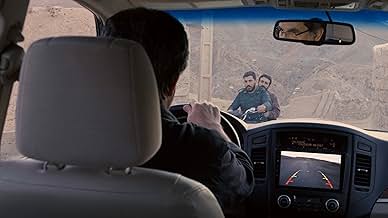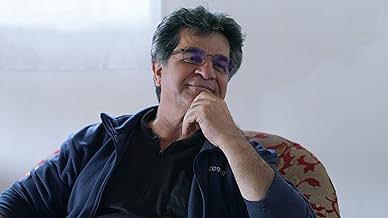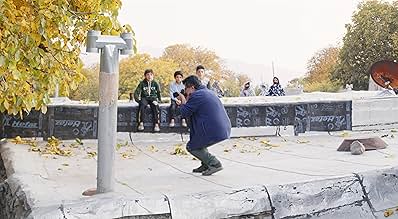CALIFICACIÓN DE IMDb
7.2/10
4.7 k
TU CALIFICACIÓN
Dos historias de amor paralelas en las que las parejas se ven frustradas por obstáculos ocultos inevitables, la fuerza de la superstición y la mecánica del poder.Dos historias de amor paralelas en las que las parejas se ven frustradas por obstáculos ocultos inevitables, la fuerza de la superstición y la mecánica del poder.Dos historias de amor paralelas en las que las parejas se ven frustradas por obstáculos ocultos inevitables, la fuerza de la superstición y la mecánica del poder.
- Dirección
- Guionista
- Elenco
- Premios
- 4 premios ganados y 8 nominaciones en total
Bakhtiyar Panjeei
- Bakhtiar
- (as Bakhtiar Panjei)
Narges Delaram
- Ghanbar's mother (Madar_e Ghanbar)
- (as Narjes Delaram)
Reza Heidari
- Reza
- (as Reza Heydari)
Aliye Tuzun
- Police
- (as Aliye Tüzün)
- Dirección
- Guionista
- Todo el elenco y el equipo
- Producción, taquilla y más en IMDbPro
Opiniones destacadas
A most excellent movie ! Thoroughly enjoyed it. For sure there were many layers and implicit meanings I missed but that is also what made this film so intriguing. The contrast between the mountain town in Iran and the city in Turkey, all the details, the character extras that clearly showed the cultural differences, I loved that. The border, the trafficking that was implied, the faithfulness to truth of the central actor who is also the director. It's also a movie that celebrates movie making, how storytelling prevails in film, the impact of a story upon the storyteller. It´s a very poignant movie.
Wonderful footage in a documentary style, great story, amazing insight into life on the frontier.
Well worth seeing.
Wonderful footage in a documentary style, great story, amazing insight into life on the frontier.
Well worth seeing.
A masterfully crafted film that showcases the incredible talent of Iranian director Jafar Panahi. Despite facing constant harassment and a six-year prison sentence on baseless charges, Panahi continues to push the boundaries of cinema with his deeply personal and thought-provoking work.
In "No Bears," Panahi plays a fictionalized version of himself as he directs a film remotely from the Iranian village of Joban, near Turkey. When his WiFi goes out, he becomes intrigued by a local ceremony and loans one of his cameras to a villager to document it. The film then follows two parallel tracks: the story of Bakhtiar and Zara, which serves as a reconstruction of a real-life event, and the recording of the ceremony, which opens up a can of worms in the village as it is used as evidence against a young woman accused of having premarital relations.
Throughout the film, Panahi deftly explores themes of truth-telling, social activism, and the blurred lines between reality and fiction. The acting is superb, with Bakhtiar and Zara's tumultuous relationship feeling both realistic and emotionally charged. The cinematography and direction are also top-notch, with the film's remote setting adding to its sense of isolation and tension.
Overall, "No Bears" is a powerful and thought-provoking film that showcases the resilience and determination of its director. It is a must-see for fans of Panahi's work and anyone interested in the intersection of art and politics.
In "No Bears," Panahi plays a fictionalized version of himself as he directs a film remotely from the Iranian village of Joban, near Turkey. When his WiFi goes out, he becomes intrigued by a local ceremony and loans one of his cameras to a villager to document it. The film then follows two parallel tracks: the story of Bakhtiar and Zara, which serves as a reconstruction of a real-life event, and the recording of the ceremony, which opens up a can of worms in the village as it is used as evidence against a young woman accused of having premarital relations.
Throughout the film, Panahi deftly explores themes of truth-telling, social activism, and the blurred lines between reality and fiction. The acting is superb, with Bakhtiar and Zara's tumultuous relationship feeling both realistic and emotionally charged. The cinematography and direction are also top-notch, with the film's remote setting adding to its sense of isolation and tension.
Overall, "No Bears" is a powerful and thought-provoking film that showcases the resilience and determination of its director. It is a must-see for fans of Panahi's work and anyone interested in the intersection of art and politics.
In 'No Bears', Jafar Panahi plays a clever game with his viewers. We see a film about the making of a film. But is this film within the film really a film, or is it reality being filmed? It sounds terribly complicated, but it isn't.
Basically, 'No Bears' consists of two parallel stories, with Jafar Panahi, who plays himself, as connecting element. Panahi, who is not allowed to leave Iran, has rented a room in a tiny village close to the Turkish border. From there, he supervises the making of a film on the other side of the border. He tries to make internet connection with his crew, but the technology fails. No worries: his assistent can cross the border freely with a hard drive containing the rushes.
By coincidence, Panahi gets involved in a bitter conflict between two family clans in the village. This is the first story. It starts relatively calm with the request to erase a photo Panahi has made. The villagers are at first visibly embarassed to disturb their distinguished guest from Teheran. It is nice to see the contrast between the villagers, who live according to ancient traditions, and the sophisticated Panahi with his MacBook and modern cameras. The conflict gets more and more serious, and ends in a tragedy.
The controversial photo itself is never shown. Here, Panahi plays again with reality. The event he has photographed may or may not have happened. He never admits having taken the photo. What the villagers want, is the evidence of its existence, or non-existence. But how can you prove something doesn't exist?
The second story is the film Panahi is making, set in Turkey. It is about an Iranian couple trying to flee to Europe. But soon it appears that the movie doesn't follow a written script. The couple are not actors, but real life refugees, and the camera follows their attempts to get out of the country. Sometimes, the crew adresses Panahi directly through the camera. It seems the fourth wall is being broken, but at the same time it isn't because we are looking at the film within the film.
Both stories are about a couple in love, and both have unhappy endings. In one very unsettling scene, Panahi is accused by one of his 'actors' to adapt reality, in order to film a happy ending. This, of course, is exactly what film making is about. Panahi's decision to film not one, but two unhappy endings is probably inspired by the unhappy situation he himself and his country are in. Panahi has been harassed for years by the Iranian regime. He has recently been released from prison, after starting a hunger strike.
In spite of this, 'No Bears' is not a sombre movie. The events in the village are in a way very amusing and even funny. Panahi himself never loses his cool and confronts the villagers in his own way: with a camera.
Basically, 'No Bears' consists of two parallel stories, with Jafar Panahi, who plays himself, as connecting element. Panahi, who is not allowed to leave Iran, has rented a room in a tiny village close to the Turkish border. From there, he supervises the making of a film on the other side of the border. He tries to make internet connection with his crew, but the technology fails. No worries: his assistent can cross the border freely with a hard drive containing the rushes.
By coincidence, Panahi gets involved in a bitter conflict between two family clans in the village. This is the first story. It starts relatively calm with the request to erase a photo Panahi has made. The villagers are at first visibly embarassed to disturb their distinguished guest from Teheran. It is nice to see the contrast between the villagers, who live according to ancient traditions, and the sophisticated Panahi with his MacBook and modern cameras. The conflict gets more and more serious, and ends in a tragedy.
The controversial photo itself is never shown. Here, Panahi plays again with reality. The event he has photographed may or may not have happened. He never admits having taken the photo. What the villagers want, is the evidence of its existence, or non-existence. But how can you prove something doesn't exist?
The second story is the film Panahi is making, set in Turkey. It is about an Iranian couple trying to flee to Europe. But soon it appears that the movie doesn't follow a written script. The couple are not actors, but real life refugees, and the camera follows their attempts to get out of the country. Sometimes, the crew adresses Panahi directly through the camera. It seems the fourth wall is being broken, but at the same time it isn't because we are looking at the film within the film.
Both stories are about a couple in love, and both have unhappy endings. In one very unsettling scene, Panahi is accused by one of his 'actors' to adapt reality, in order to film a happy ending. This, of course, is exactly what film making is about. Panahi's decision to film not one, but two unhappy endings is probably inspired by the unhappy situation he himself and his country are in. Panahi has been harassed for years by the Iranian regime. He has recently been released from prison, after starting a hunger strike.
In spite of this, 'No Bears' is not a sombre movie. The events in the village are in a way very amusing and even funny. Panahi himself never loses his cool and confronts the villagers in his own way: with a camera.
Film director Jafar Panahi is prohibited from leaving Iran, but is trying to make a film in neighbouring Turkey. In order to make that work, he moves to a remote village near the border, where the communications are a bit hit and miss. With the help of his obliging host "Ghanbar" (Vahid Mobaseri), though, he tries to make the best of it. Initially, it's a friendly village but when he takes (or doesn't!) a photograph of a young couple, he finds himself drawn into an increasingly acrid stand-off between two young men, and their families, to whom a girl may have been betrothed when her umbilical cord was cut. His frustrations with these encroachments are not helped by production difficulties with the two two stars of his documentary-style film - real life lovers who are trying to find a way to escape, safely, to Paris. There is the slightest hint of menace here as the plot develops and although we see little actual evidence, there is a distinct sense that this man is increasingly unwelcome, despite the platitudes from the villagers, encouraging a sixth-sense feeling that the authorities are distantly watching this film-maker. There is a distinct perception of intimidation! What is also clear is that these ordinary Iranian people live in fear of the police, the Revolutionary guard and that rather flies in the face of their genuine, peaceable and hospitable, nature. Now, perhaps Panahi's less-is-more style works for some, but for me I found this all rather a slow watch. He shuffles around with little useful dialogue to develop his on-screen persona, nor my interest in him. Clearly this is a story about freedom and a sort of subliminal oppression but somehow the characters themselves here didn't really develop that theme sufficiently, nor did they really engage me. The ending, too, is disappointing and inconclusive in equal measure and I was rather underwhelmed. The film does offer us an interesting depiction of rural life that probably hasn't changed in millennia, but somehow I felt little better than a fly on the wall with nowhere near enough to go on to join in. Perhaps just too much of this is predicated on a knowledge by the audience of this director and of his relationship with his government.
Telling the truth is difficult for Iranian filmmakers. You have Government control on one hand (the real tale of Panahi remotely directing a film being shot in Turkey while stationed on the borders of Iran as he is not allowed to leave the country) and you have quaint traditions on the other (in the Iranian villages on the border) that often lead to tragedy. However good your intent, the road is bumpy and leads you to a sad, nihilistic end. Intelligent filmmaking that captures the difficulty of renowned filmmakers to capture the Kafkesque ground reality in Iran and the frustrations of Iranian nationals today. Deserved the Special Jury Prize at Venice.
¿Sabías que…?
- TriviaActually, the entire scene shot in Istanbul Kadikoy, not in Turkish border town.
Selecciones populares
Inicia sesión para calificar y agrega a la lista de videos para obtener recomendaciones personalizadas
- How long is No Bears?Con tecnología de Alexa
Detalles
Taquilla
- Total en EE. UU. y Canadá
- USD 167,333
- Fin de semana de estreno en EE. UU. y Canadá
- USD 6,173
- 25 dic 2022
- Total a nivel mundial
- USD 1,196,288
- Tiempo de ejecución
- 1h 46min(106 min)
- Color
- Relación de aspecto
- 1.85 : 1
Contribuir a esta página
Sugiere una edición o agrega el contenido que falta























